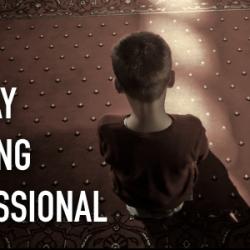 If you’re like me, COVID-19 has laid waste to your daily routines. Short estimates say 8-12 weeks, longer ones predict 12-18 months will pass under this state of emergency. This means that one of the most important things you can do right now is to sit down with the people you love and design a healthy routine to ground your common life throughout this season.
If you’re like me, COVID-19 has laid waste to your daily routines. Short estimates say 8-12 weeks, longer ones predict 12-18 months will pass under this state of emergency. This means that one of the most important things you can do right now is to sit down with the people you love and design a healthy routine to ground your common life throughout this season.
Author Rebecca Solnit once noted that imbedded in the word emergency, is the word emerge. “From an emergency,” she writes, “new things come forth. The old certainties are crumbling fast, but danger and possibility are sisters.” This seems profound to me: danger and possibility are sisters. From an emergency, a new routine can emerge, and this doesn’t have to be all bad. Thrust outside of our settled states of certainty and comfort, perhaps we can allow ourselves to awake to the possibility of something radically new, maybe even better.
Some of the most important work we need to do right now involves establishing new routines, new ways to work, play, relate, and thrive. We have the opportunity to be more intentional with the way we structure our time, and to do in ways that make us more fully human.
Practice – Habit – Reflex – Character
Annie Dillard once wrote, “How we spend our day is, of course, how we spend our lives. What we do with this hour, and that one, is what we are doing.” Aristotle knew this 2,000 years earlier, only he would add a wrinkle: how we spend our days is, of course, part of who we are becoming.
The way you structure your daily routine in this season will shape the kind of person you become. Aristotle believed human beings were neither slaves to destiny, nor victims of their own character. We can impact our own character and virtue. And the way we do this is as simple as learning how to drive. The first time you sat behind the wheel of a car, you sucked at driving. That’s why we made you start in parking lots where you couldn’t hurt anyone. This is the practice phase of virtue formation.
I still remember how strange the brakes and accelerator felt beneath my feet, gauging how the car reacted to every movement of the steering wheel. I could not execute all the things I was attempting to do at first. But, after a few weeks of practice, driving started to become a habit. We moved from side streets to traffic. Control of the car became automatic, a habit I could execute anytime I decided to.
After a few months the ability to drive migrates deep down into the lizard brain, a place of automaticity. Driving becomes a reflex. This is why you can leave work in your car and wake up in your driveway thinking, how in the world did I just get home? I’m home, but I don’t remember anything about the drive. What’s interesting about a reflex is that it is transferrable to any situation. If you climb into a different car, or encounter a new type of terrain, you don’t need to relearn how to drive. The ability to drive transfers.
As time goes by, you’ll notice you have a desire to hit the open road. You will probably even come to love what a car allows you to do, the freedom to explore, the potential for relating & working, or just the joy of driving. Driving has woven its way into your character. It’s part of what defines you as a person. You are a driver.
That’s the process of how character formation proceeds: practice, habit, reflex, desire, love, character.
Scheduling for Virtue
Now think of a virtue, like patience. How might one develop patience? Well, you start with a practice. Stand in the long line at the store. Move your car into the most crowded lane at the stoplight. You put yourself in situations where you have to practice patience. Just as with driving, you’ll suck at patience for awhile. Soon, however, it will become a habit. You won’t always think to be patient, but whenever you do you’ll know how to do patience.
After months of habitual patience you’ll find that your natural response to any situation that involves frustration, waiting, urgency, or delay, will be patience. It’s a reflex now, transferrable from one place to another — home, work, friendships, even your spirituality and relationship to yourself.
You’ll notice is that there are some communities in which it’s easier to practice patience. This is because there is almost always a community at work behind any virtue — a family, church, workplace, classroom, or team — that will train its members to embody the character of the group. If you want to become patient, you must be nurtured by a patient community. This is true of any virtue.
And when you are with an impatient community, it’s harder to practice patience. You’ll begin to notice a deep desire for a patient community, and for all of the gifts that patience brings to my life.
Then, once you return to your patient community, you will feel a deep sense of love for that community, and even for patience itself. Patience has become part of who you are — part of your character.
And character, as Aristotle knew — is destiny.
This is why our habits, rhythms, and practices are so powerful and transformative. We are fired into the world by our desires and our loves. We chase the things we love. We sacrifice and work toward those things we desire. The energy and power that propels us out into the world comes from desire and love.
We can either become slaves to those desires, or we can shape those desires through the formation of virtue. Any Spirituality is about what we do with those desires.
Ronald Rolheiser says it this way: “Spirituality is not about rationally choosing activities like going to church, praying or meditating, reading spiritual books, or setting off on some spiritual quest. It is far more basic … Spirituality concerns what we do with desire.”
The COVID-19 pandemic has drastically changed our daily routines for the foreseeable future — nobody can avoid this. We’ll have to establish brand new rhythms that feed our healthiest desires and loves, and help us become better humans as a result.
Of course how we spend our days is how we spend our lives. What we do with this hour, this evening, this week — is what we are doing, is who we are becoming. We can be blown about by the winds of chaos and whim, or we can set a new daily rhythm that will allow us to cultivate healthy desires, loves, and character.
Practical Steps for Designing a New Daily Routine:
Step One
Take a blank sheet of printer paper and divide it into four equal sections that you label: God, others, self, nature. Brainstorm a list of practices that would feed those relationships. Start with the things you are already doing. List them all without judging whether or not they are realistic, or dismissing them because of your past failures. What are the practices you could engage in so as to maintain a connection with God, others, self, and nature? Don’t forget quotidian daily practices like bed times, meals, and so on.
Step Two
Once you’ve got a pretty good list going, take a step back … and read over each section. Underline the practices you already do that will work even in social distancing. Then draw a line through the practices you know you’ll never do. Sort through them, and underline one or two practices from each section that you would really like to make part of your new routine.
Be careful to be realistic about your capacity. You can’t start 25 new habits in one week. Be choosy — try to hone in on practices that seem very doable for you, and limit yourself to just a few of them.
Step Three
Go thru the list of underlined possibilities and label the practices that can be daily practices with a “d”. Things that seem more like weekly practices, label with a “w”. Do the same thing for monthly, quarterly, yearly… that’s step three.
Step Four
Once you’ve identified the rhythms you think are realistic and important, and you’ve labeled them as daily, weekly, monthly & so on. Now, you find a way to wire those practices to your schedule, and there are two main ways to do this.
If your routine is consistent from day to day, then simply schedule your practices into your daily, weekly, monthly rhythm. Try not to do too many, and start with small things that will be easy to accomplish. Set alarms for yourself, or just enter your new rhythm into your daily calendar so you get reminders.
Then, post your schedule where others can see it and keep you accountable. Ask them to do the same.
If your routine is constantly changing from day to day, you might want to steer clear of a timed schedule. Some practices can be consistent no matter what — like the things you do when you get up, or just before bedtime.
For the rest of your rhythm, think of it more like a checklist. It’s like the difference between basketball and baseball. Basketball games are over when the clock runs out — goes by time. Baseball games don’t go by times. Baseball games are over when certain things are accomplished (9 innings, 3 outs per team, clear winner). So, if your schedule is constantly changing, then your daily routine may need to be more like a checklist … and you just declare — my day’s not over until I do these five things. Then you begin each day by scheduling each of those five practices according to what your day involves.
Now, just as you made your list around relationships to God, others, self, & nature — you may want to make some other lists. There are the Christian virtues of Faith, Hope, and Love. There are the fruits of the Spirit: Love, Joy, Peace, Patience, Kindness, Goodness, Faithfulness, Gentleness, Self-Control. There’s the list of virtues from Col. 3: Compassion, Kindness, Humility, Gentleness, Patience, Forgiveness, Love, Peace, Wisdom, Thankfulness. Maybe one or two of those virtues really stick out to you and you’re thinking — I need to work on patience, I need to work on gentleness. Write that word at the top of the paper. Then work those practices through these steps until you wire them to your rhythm.
Don’t Forget These Central Practices
For Christians there are few consistent Christian practices that have historically… been non-negotiable. For instance:
Sabbath Keeping: a day to not work & generate life, but to receive life as a gift and delight in the goodness of being alive. Part of what it means to be a Christian is to keep the Sabbath. You could start this practice during this time.
Tithing: the practice of taking 10% off the top of our income & giving it away is called tithing (tenthing). This has the impact of making the other 90% holy, and subverts the hold money has on our lives. I like to say tithing is like cutting the rope tied to our leg that is dragging us to the bottom of the ocean. We cannot draw our lives & our safety from money. Tithing is this practice that teaches us how true that is…
Worship: Weekly worship has always been part of the church’s rhythm.
Daily prayer: morning, midday, and evening prayer will change your life. If you want more information on this you can to to the Redemption Church KC Podcast. We actually have a 4 part class called A Guide to Christian Prayer that’ll walk you thru all of this in depth.
Have the Conversation
Kristin & I and our 2 boys did this a few days ago. We just went through our entire day & made out a daily routine. When will we get up, or go to bed? What time will we eat together? We established some electronic device free zones in each day, times to exercise, times to do some daily chores. We established how to get alone time, and times to check in and share how we are doing. In the end we drew up a schedule to guide us, and a way to adjust as we go.
Once you’ve done this, you have the beginnings of what is sometimes called a Rule of Life, or Rhythm of Life, or what Annie Dillard called “A net for catching days.”
And here’s why I think this is so important. There’s no way that any of us can possibly imagine all that will be required of us over the next year or two. We’ve never done this before. We can’t think about every moral, ethical, or relational possibility and then decide (ahead of time) how we should all act. It’s to complex & there are too many unknowns.
The best we can do is establish a healthy rhythm that will allow us to become virtuous people who have strong character, people who will just naturally react to whatever comes our way; the way Jesus would react if he were in our shoes. That’s the goal — to see our character formed by the Character of Christ.
And the process is as simple as learning how to drive. It’s not quick & easy, but it is simple. It just takes time and practice.
I’m going to leave you will a few paragraphs from a book called Patterns: Ways to Develop a God-Filled Life, by Mel Lawrenz. He writes this:
“All of life is built on patterns. In the natural world bees form their honeycombs, robins piece together their nests, trees add ring upon ring, geese migrate north and then south, planets loop around the sun all in progressive and wonderfully consistent patterns. Some set patterns seem to be purely the joyful expression of the exuberant Creator: the waves of sand in the desert, the waves of water in the ocean, the orderly and vivacious bands of color of the rainbow…
And then there are chosen patterns, the behaviors that shape our character, form our reputation, and determine our satisfaction in life. These are our habits. How many hours do you sleep at night? Do you smoke cigarettes throughout the day? Do you pray? How do you speak to your parents, to your spouse, and to your kids? How do you respond to stressful circumstances? What do you do when you feel angry? What do you read? What are you expecting to happen when you go to church?
This list could go on, because anything we do in life with any kind of repetition is a life pattern – whether it builds us up or tears us down. And there’s the rub: a good pattern progressively builds us up, but a bad pattern relentlessly erodes our humanity, like ocean waves pounding a coast. Being unaware of our life patterns is about the biggest gamble any of us can take.”












